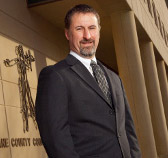
Randall Brown MD, PhD, FASAM
MADISON- Noting that opioid overdoses and deaths have increased more than 300 percent in Wisconsin over the past decade, a team of researchers from the UW School of Medicine and Public Health has an innovative plan to reduce opioid addiction and overdose and to establish a screening tool to be tested at trauma centers in Wisconsin.
The three-year project, designed by Dr. Randall Brown, an addiction specialist with the department of family medicine and community health, is funded by a $500,000 grant by the Wisconsin Partnership Program. Brown will work with Andrew Quanbeck, a scientist in the UW College of Engineering and collaborators in UW Hospital’s trauma surgery group. Quanbeck will focus on implementing the tool, work flow issues and how to measure success.
“Opioid addiction and overdose have reached epidemic proportions in Wisconsin and in the United States,” said Brown. “We urgently need effective means to identify risk for opioid-related complications, and interventions to prevent opioid use disorders and overdose deaths.”
In the first year of the study next year, clinicians from Wisconsin trauma centers will be invited to a summit where they will be surveyed about practices related to opioid risk screening, potential barriers to screening and resources available to support patients with opioid use disorders.
The researchers will also recruit traumatic-injury patients at University Hospital’s Level I Trauma Center for opioid screening development. Up to 490 study participants will provide information on socio-demographics, substance use history, opioid misuse risk, mental health, medical history and injury and pain severity. Follow-up visits will be scheduled four, 12 and 24 weeks after hospital discharge. The information gathered will be the basis for development of an opioid risk screening tool to be tested at Level I and II trauma centers in Wisconsin in the third year of the project. The trauma centers include University Hospital, Gundersen in La Crosse, Theda Clark Medical Center in Neenah and the Medical College of Wisconsin.
“It will be a fascinating project that will bring together different types of expertise like family medicine, addiction medicine, surgery, social work, population health sciences and industrial and systems engineering,” said Brown.
